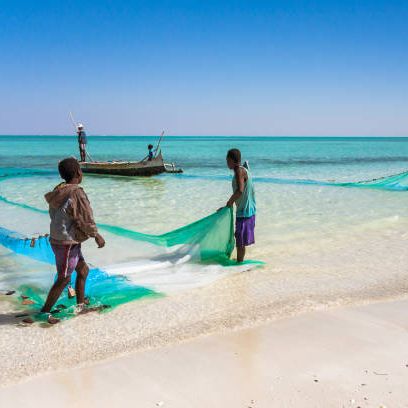The current social situation within the Members of the OACPS calls for flexible, innovative and inclusive approaches to tackle poverty and its root causes, i.e. shortcomings in education and health. Extreme poverty remains the biggest challenge in most Member States and poverty remains as a central element of the 2030 Agenda, which strengthens efforts to incorporate dimensions of inclusivity and sustainability.
Only a healthy and skilled population can muster the necessary energy to lift a country out of poverty and put it on track for sustainable and inclusive development. Technical and vocational education and training and skills development are key contributors to linking education systems, employment and private sector development.
Environmental protection is critical for inclusive and sustainable economic growth and is a key factor in the transition to an inclusive green economy. Sustainable development continues to be threatened by a range of factors which jeopardize the survival of many ACP countries, particularly least developed countries (LDCs) and small island developing states (SIDS).
The 11th European Development Fund (EDF) Intra-ACP strategy intensified inclusive and outcome-oriented development actions within and between ACP regions. The strategy was intended to address the environmental, social and economic dimensions of sustainable development and was structured around three sectors that ensured access to basic needs, contributed to a more sustainable environment and promoted the private sector as an engine of economic growth.
The Intra-ACP Indicative Programme operates in the following areas:
The Cotonou Agreement (Annex IV, Article 12) defines intra-ACP cooperation as a supra-regional cooperation addressing the shared challenges facing ACP States through operations that transcend the concept of geographic location and benefit many or all ACP States.
The 11th European Development Fund (EDF) intra-ACP strategy embraces an intra-ACP cooperation that supports inclusive development efforts. It does this through direct development actions and by promoting and supporting dialogue and consensus building among ACP States including promoting knowledge management and exchange of best practices on shared challenges.
The 11th EDF intra-ACP strategy intensified inclusive and outcome-oriented development actions within and between ACP regions. The Strategy is intended to address the environmental, social and economic dimensions of sustainable development and be structured around three sectors that will ensure access to basic needs, contribute to a sustainable environment and promote the private sector as an engine of economic growth.
Intra-ACP Projects Matrix | MAP
Intra-ACP Projects Matrix | English version, December 2023
Intra-ACP Projects Matrix | French version, December 2023
Intra-ACP Projects Matrix | English version, July 2023
Intra-ACP Projects Matrix | French version, July 2023
Intra-ACP Projects Matrix | English version, December 2022
Intra-ACP Projects Matrix | French version, December 2022
Intra-ACP Projects Inventory Matrix (June 2022)
Intra-ACP Projects Inventory Matrix (December 2021)
Intra-ACP Projects Inventory Matrix (June 2021)
Intra-ACP Projects Inventory Matrix (December 2020)
Intra-ACP Projects Inventory Matrix (June 2020)

Department of Political Affairs and Human Development (PAHD)
The Department of Political Affairs and Human Development (PAHD) manages the implementation of international partnerships in the areas of human development and monitors the political situation in its member states.

Department of Macroeconomics, Development Finance and Programming (MFDP)
The Department of Macroeconomics, Development Finance and Programming (MFDP) coordinates the Secretariat’s activities in the areas of programming, financial and technical cooperation between OACPS and partners, including the EU.

Department of Environment and Climate Action (ECA)
The Department of Environment and Climate Action (ECA) coordinates the Secretariat’s activities in the area of sustainable development, with a focus on food security and climate change.

Department of Structural Economic Transformation and Trade (SETT)
The Department of Structural Economic Development and Trade (SETT) coordinates the Secretariat’s activities in the areas of sustainable economic development, with a focus on trade and trade-related issues such as commodities and value chain development, customs cooperation, market access and WTO negotiations.

Department of Administration, Finance and Human Resources (AFHR)
The Department of Administration, Finance and Human Resources (AFHR) manages the administrative, financial and human resource functions of the OACPS Secretariat.
The OACPS Geneva Office was established initially in December 2001 as a project to assist the OACPS in its negotiations with the World Trade Organization (WTO) relating to trade matters. It is now the Permanent Delegation of the OACPS to the United Nations and other International Organisations in Geneva. It enjoys full diplomatic status and has a mandate to:
The African, Caribbean and Pacific Information Centre for South-South and Triangular Cooperation was inaugurated on 5 October 2018 in Malabo. The ceremony was presided over by The President of the Republic of Equatorial Guinea H.E. Obiang Nguema Mbasogo. The Headquarters Agreement was signed on 9 August 2019 in Malabo, Equatorial Guinea.
The Centre in Malabo is important for the ACP Group both for its uniqueness in being the first ever representation of the ACP Group in a Member State and for being a milestone in the promotion and implementation of South-South and Triangular Cooperation.
At the inauguration of the Centre, H.E. Mbasogo stated that the Centre would be, “the manifestation of solidarity between the peoples and countries of the South in order to contribute to their autonomy and to the achievement of the internationally agreed development goals, especially those related to the Agenda 2030 for Sustainable Development.”
The ACP Information Centre for South-South and Triangular Cooperationis intended to
The Centre will undertake its activities in the global context of development cooperation and contribute to fulfil global agendas, such as the 2030 Agenda for Sustainable Development and facilitate the achievement of its 17 Sustainable Development Goals (SDGs), as well as the Paris Agreement on Climate Change, and the Addis Ababa Action Agenda on Financing for Development.